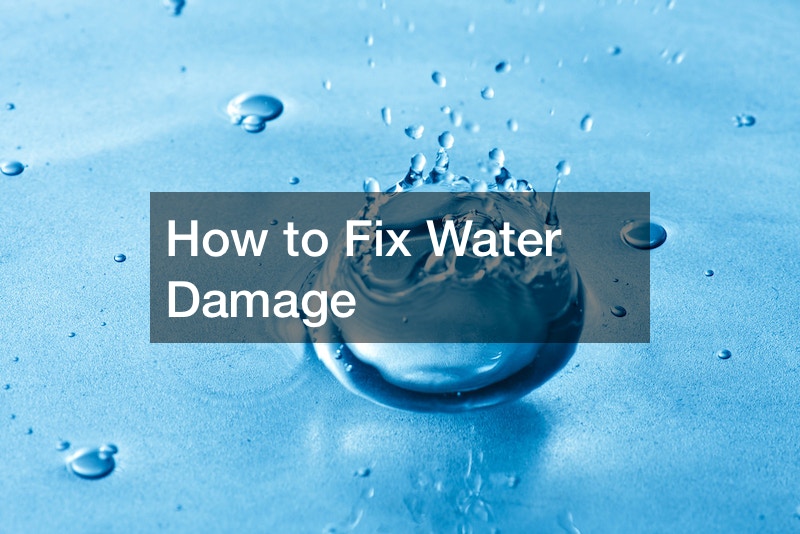
Water damage can be devastating and, in some cases, even dangerous. Many things lead to water damage, such as a leaking roof, plumbing issues, bad weather, or even excess water getting into the house during or after a flood. Regardless of the cause, it’s essential to begin repairs as soon as possible. At the same time, it’s crucial to seek the services of a water damage company. Some things homeowners can handle on their own, however.
The first step would be to stop the water flow: it’s essential to find the water source and turn it off, if possible. The next step would be to get rid of the water. Ensure the house is completely dry after a flood. Opening windows, turning on fans, and heat can also help remove moisture. Disinfect the house to avoid getting mold. Assess the damage done, then begin the property damage restoration.

There’s a lot of damage to a building and other household items that accidental discharge of water can cause. That’s why it’s crucial to have accidental water damage insurance. Getting in touch with your insurance company is essential in cases of accidental water damage. Determine how much they can cover to determine the repair and renovation process.
Water damage can quickly ruin your property, and even a small leak can escalate quickly and become a major problem. Wet housing materials can develop mold in as little as 24 hours, and dry rot–which loves warm, moist environments–can disintegrate your wood before you know it. If you’re looking to renovate your home, redo your siding, or do some siding repair, chances are you also need to fix water damage. Here are five tips on how to fix water damage: and when to know it’s time to call a professional.
Identify the Type of Water
Before you can do anything other than turn off any electricity to the affected area, you need to tell whether you have what’s considered “clean” water. That’s water from rain or condensation, or even from leaky pipes. This type is fine to try to clean up on your own, and if you do need help it’s the cheapest type to get cleaned. “Grey” water is the second type, and this is water from something like a washing machine or a dishwasher. It might have some contaminants, but it’s probably ok to clean by yourself with some basic safety gear. Getting outside help to clean this up will cost a bit more.
The final type of water is “black” water, which is flood water or water from sewers. This is filthy, full of bacteria and who knows what else, and you should never try to clean it up on your own. For this type of water leak, always call in water damage repair professionals.
Look for Mold
Mold is one of the most serious issues you can face when you go to fix water damage. Mold starts growing quickly, and some kinds of mold are completely toxic to humans. If the mold is relatively fresh and contained, you can wear a mask, pull it out, bag it up, and get rid of it right away. While you’re at it, you’ll also want to toss any material that is porous and damaged, especially fabrics and insulation. If the mold is widespread or has clearly been growing for a while, you’ll want to get out of the house and call in some pros to help you fix it.
Dry and Disinfect
Remember, the water is causing more damage every moment it sits there. Open windows, get some fans going, and even consider renting a big dehumidifier. If those fixes aren’t working, or if you’re just not sure you can get it all before it starts really growing mold, then call a pro. Once it’s all dry, disinfect everything. There are plenty of disinfectants on the market and some that particularly target mold. Regular bleach is always an option, too.
Look to the Wood
Any wood that you find warping, or any wood that’s developed a problem with mold or mildew, should be replaced. Here’s where things get tricky because it’s essential that all the supports be done right. If you’re not completely sure you know what you’re doing, remodeling companies can help you fix water damage and get your home back to normal.
Think About New Floors
If you know exactly where your water damage came from, you might not need to worry. If it’s not immediately clear what happened, or if there’s a chance it could happen again, then getting new waterproof flooring put in could save you further angst in the future.
Don’t hesitate to fix water damage as soon as you find it. That way your home and the investment you have in it can stay safe and secure.
